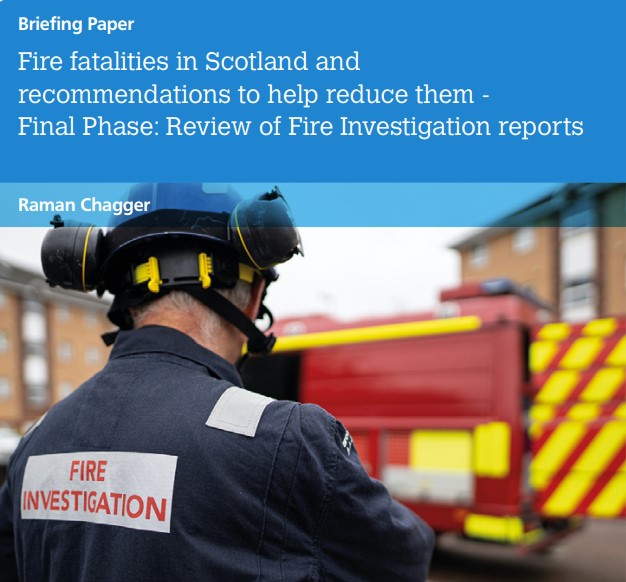Fire fatalities in Scotland
Contents |
[edit] Introduction
The research entitled Fire fatalities in Scotland and recommendations to help reduce them – Final Phase: Review of Fire Investigation reports has led to a number of recommendations that, if implemented, would be expected to result in a reduction in fire fatalities.
[edit] Investigative reports
This final phase of collaborative research study investigating fire fatalities in domestic dwellings in Scotland involved a comprehensive qualitative and quantitative review of Fire Investigation reports. The reports, generated from 126 fires over a four-year period, were produced and supplied by Scottish Fire and Rescue Service (SFRS).
The stakeholder group, comprising the Fire Industry Association, SFRS, Scottish Government and BRE Global, reviewed the Fire Investigation reports. A number of recommendations have resulted that are aimed at different groups including care package suppliers, manufacturers of electronic equipment, public services (NHS, carers, social workers, police, SFRS), the general public and researchers.
[edit] Greater role for technology
The findings demonstrate that whilst new and emerging technologies may provide additional protection in the future, the greater use of existing technologies could be applied immediately and would be expected to save lives. Some of these include providing inter-linked smoke alarms in bedrooms and living spaces, the greater use of the certified watermist systems and greater communication of agencies, neighbours and relatives with the SFRS when an at-risk person has been identified.
Two key areas for warranting further research were proposed which were an experimental investigation of the common electrical items involved in starting fires and a demonstration of the effectiveness of current approved suppression strategies.
The briefing paper ends with an example concept strategy intended for Fire and Rescue Services to assist with the risk classification of vulnerable individuals and proposes solutions that would provide appropriate levels of life safety protection. The findings may be of use to fire and rescue services generally to enable them to identify vulnerable people most at risk and propose interventions to protect them.
BRE Global are exploring opportunities for performing similar collaborative studies in other countries.
This article originally appeared under the headline, "Fire fatalities in Scotland and recommendations to help reduce them – Final Phase: Review of Fire Investigation reports." It was posted in December 2020.
[edit] Related articles on Designing Buildings Wiki
- BRE articles on Designing Buildings Wiki.
- Building safety in Wales.
- Fire and rescue service.
- Fire in buildings.
- Fire safety design.
- Fire (Scotland) Act 2005.
- Interlinked fire alarm safety laws in Scotland.
- Ionisation smoke alarm.
- Multi-sensor alarm.
- New standards for better fire safety in homes.
- Optical smoke alarm.
- Scottish Advice Note addresses fire risk in multi-storey residential buildings.
- Scottish building standards.
- Scottish planning and architecture documents.
- Smoke detector.
- The Regulatory Reform (Fire Safety) Order 2005.
[edit] External resources
Featured articles and news
Infrastructure that connect the physical and digital domains.
Harnessing robotics and AI in challenging environments
The key to nuclear decommissioning and fusion engineering.
BSRIA announces Lisa Ashworth as new CEO
Tasked with furthering BSRIA’s impressive growth ambitions.
Public buildings get half a million energy efficiency boost
£557 million to switch to cleaner heating and save on energy.
CIOB launches pre-election manifesto
Outlining potential future policies for the next government.
Grenfell Tower Inquiry announcement
Phase 2 hearings come to a close and the final report due in September.
Progress from Parts L, F and O: A whitepaper, one year on.
A replicated study to understand the opinion of practitioners.
ECA announces new president 2024
Electrical engineer and business leader Stuart Smith.
A distinct type of countryside that should be celebrated.
Should Part O be extended to existing buildings?
EAC brands heatwave adaptation a missed opportunity.
Definition of Statutory in workplace and facilities management
Established by IWFM, BESA, CIBSE and BSRIA.
Tackling the transition from traditional heating systems
59% lack the necessary information and confidence to switch.
The general election and the construction industry
As PM, Rishi Sunak announces July 4 date for an election.
Eco apprenticeships continue help grow green workforce
A year after being recognised at the King's coronation.
Permitted development rights for agricultural buildings
The changes coming into effect as of May 21, 2024.























